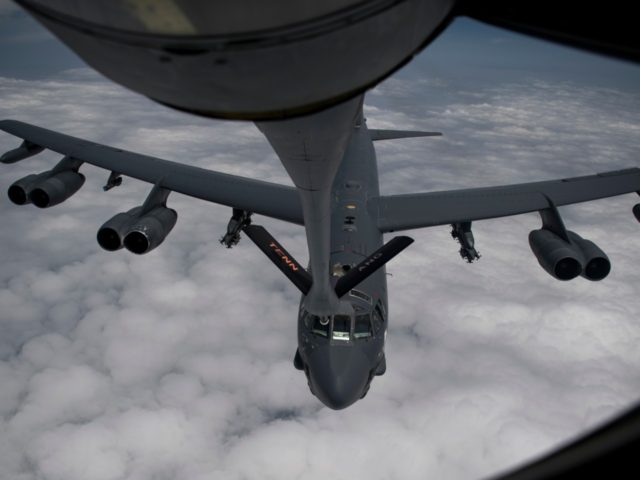U.S. warplanes struck targets in Iraq and Syria over the weekend, killing at least 25 members of an Iran-backed Shiite militia group called Kataib Hezbollah that was held responsible for a rocket attack on Friday that killed an American civilian contractor.
U.S. officials called the strikes a success, condemned Iran for supporting terrorism, and said further action against Iran’s proxies might be forthcoming.
Kataib Hezbollah (KH), whose name is also spelled “Kata’ib Hezbollah” or “Kataeb Hezbollah” in English, is one of the most powerful Iranian proxy forces in the Middle East. Supported by Iran’s Islamic Revolutionary Guard Corps (IRGC) and led by an IRGC trainee with links to the notorious Gen. Qasem Soleimani, KH was formed in 2006 and has operated as one of Iraq’s Popular Mobilization Units (PMU/PMF) – essentially government-sanctioned vigilante militias that fought against the Islamic State – since 2014.
Kataib Hezbollah has amassed significant military, financial, and political power in Iraq. It was instrumental in crushing the Kurdish independence movement in 2017 and collaborated with Iran to support the regime of dictator Bashar Assad in Syria. It is opposed to the protest movement in Iraq and denounced President Barham Salih last week for refusing to appoint a pro-Iran Prime Minister, an appointment Salih said would enrage Iraqis who want Iran to have less influence over their government.
KH was designated a foreign terrorist organization by the U.S. government in 2009 for conducting terrorist attacks against U.S. forces and “threatening the peace and stability of Iraq.” It was the first Shiite militia in Iraq to be so designated.
U.S. airstrikes against KH were launched in response to a rocket attack on Friday against a base near Kirkuk. A number of American and Iraqi troops were wounded and a U.S. civilian contractor was killed. It was the latest in a string of rocket attacks over the past two months blamed on Iran-backed Shiite militia in Iraq. U.S. and Iraqi officials immediately suspected KH was the perpetrator.
According to U.S. Defense Secretary Mark Esper on Sunday, American planes struck three KH targets in western Iraq and two in eastern Syria. He classified the targets as “weapons storage and command and control facilities.”
“What we did was take a decisive response that makes clear what President Trump has said for months and months and months, which is that we will not stand for the Islamic Republic of Iran to take actions that put American men and women in jeopardy,” Esper said.
Esper added that the U.S. “will take additional actions as necessary to ensure that we act in our own self-defense and we deter further bad behavior from militia groups or from Iran.”
“We will not stand for the Islamic Republic of Iran to take actions that put American men and women in jeopardy,” Secretary of State Mike Pompeo said after briefing President Donald Trump on Sunday.
The Pentagon said the “precision defensive strikes” were intended to “degrade KH’s ability to conduct future attacks against OIR [Operation Inherent Resolve] coalition forces.” The Iraqi army reported recovering several militia bodies from the attack sites, including a local commander. A total of four such commanders were reportedly killed.
KH was named as the perpetrator of the rocket attack on Kirkuk in the Pentagon statement, which said Iraqi government is equally determined to “see these KH attacks on ISF [Iraqi Security Forces] and OIR forces cease once and for all.”
“KH has a strong linkage with Iran’s Quds Force and has repeatedly received lethal aid and other support from Iran that it has used to attack OIR coalition forces,” the statement noted.
Iran lashed out at the United States on Monday, condemning the airstrikes as “terrorism.”
The Iranian Foreign Ministry said the U.S. strikes “prove the false claim” that America is fighting against the Islamic State, on the grounds that KH has been active in fighting ISIS in Iraq.
Iran said the airstrikes demonstrated America’s “disregard for the independence and sovereignty of countries” and demanded the U.S. “bear the responsibility for the consequences of this illegal action.”
“We strongly deny any role in the attack on American forces. This claim without any evidence cannot justify bombing and killing people in violation of international law,” a spokesman for the Iranain regime said.
“The blood of the martyrs will not be in vain and our response will be very tough on the American forces in Iraq,” declared KH founder Abu Mahdi al-Mohandes, who is now a senior commander in the umbrella PMF organization.
Parliamentarians from Iraq’s Fatih political alliance, which is largely composed of PMU militia leaders, condemned the airstrikes as an “insolent” attack on “national sovereignty and Iraq’s dignity.” Lebanese Hezbollah, a sister organization to Kataib Hezbollah, used similar terms to denounce the American military action.
In less troubled times, the Pentagon acknowledged the work of Popular Mobilization Units in defeating the Islamic State in Iraq, saying they “deserve a share of the credit for their sacrifices.” This praise tended to be somewhat oblique, avoiding the names of individual militia groups like Kataib Hezbollah that had a history of attacking U.S. forces in Iraq and stipulating that PMU forces should remain under the control of the Iraqi government.
In 2018, as the Iran-backed Shiite militia groups became an increasingly clear threat to Iraqi security and OIR coalition forces, the Pentagon said supporting the PMU against ISIS was necessary but called on the militias to become more thoroughly integrated with, and controlled by, the Iraqi Security Forces.
“We agree with senior Iraqi political and religious leaders that all armed actors should operate within Iraq’s state security framework and answer to the prime minister,” Pentagon spokesman Cmdr. Sean Robertson told Breitbart News in November 2018.

COMMENTS
Please let us know if you're having issues with commenting.